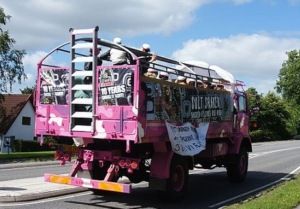News
Students coming to grief in traditional graduation drive-arounds
This article is more than 7 years old.
What should be one of the highlights of an upper-secondary school student’s graduation is increasingly coming under the spotlight for safety reasons

High spirits + lots of alcohol + an open truck can be a seriously dangerous combination (photo: Jens Cederskjold)
On Saturday, a 19-year-old man fell from the back of a truck in Tappernøje, southern Zealand while taking part in the traditional Danish student practice of driving round visiting all the parents in the class, accompanied by drinks, loud music and general high-jinks.
The man sustained severe head injuries and had to be flown by helicopter to the main hospital in Copenhagen, Rigshospitalet, where his condition is still critical, reports DR Nyheder.
In addition, a group of students from Nørresundby Gymnasium were also involved in an accident when the truck they were riding in had to brake suddenly.
And on Sunday in what could easily have been a fatal accident, a 19-year-old from Køge hit his head while standing up on the seats in the back of the truck he was riding in when it went under a bridge. The man was extremely lucky and only sustained possible concussion, scrapes and shock.
READ MORE: End of the road for trucks of screaming teens?
What’s fun is not always safe
Enhedslisten’s traffic spokesperson Henning Hyllested has now called for a review of the safety of these traditional student drive-arounds and, if necessary, a ban on them.
“It’s a really incendiary cocktail when you have young people in a total party mood who are more or less drunk in the open back of a truck going 50-60 km per hour without them being strapped in,” said Hyllested.
Hyllestad intends to raise the matter with the Færdselssikkerhedskommissionen traffic safety commission. He suggests that in future, students should be transported in buses on which there are safety belts, and that they should “have a party at their destinations”.
However, the chair of the commission, Dansk Folkeparti’s Kim Christiansen, thinks Hyllested is overreacting.
“I think it’s a bit like breaking a butterfly on a wheel spoiling a memorable day for thousands of young people,” said Christiansen.










































